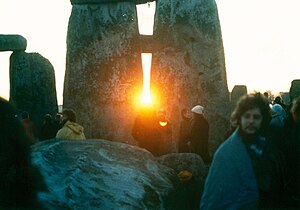| The Winter Solstice at Stonehenge |
Halloween, or Samhain, was one of those Pagan festivals. Samhain was halfway between the
 |
| Samhain Bonfire |
 The traditional Halloween party game of "Bobbing for Apples" was part of the Samhain festivities. It was believed that the first person to successfully take a bite out of a bobbing apple (apples floating in a barrel of water) would be the first to marry or find their sweetheart in the coming year. Similarly, when peeling an apple, the length of the peel achieved would signify how long that person would live. Variations on the theme would exist depending in what part of the country you lived, but the Samhain festival would essentially be the same. Most ancient cultures had a celebration to welcome the onset of winter and these have survived in one form or another to the present day, with Mexico's "Day of the Dead" being one of the most notable.
The traditional Halloween party game of "Bobbing for Apples" was part of the Samhain festivities. It was believed that the first person to successfully take a bite out of a bobbing apple (apples floating in a barrel of water) would be the first to marry or find their sweetheart in the coming year. Similarly, when peeling an apple, the length of the peel achieved would signify how long that person would live. Variations on the theme would exist depending in what part of the country you lived, but the Samhain festival would essentially be the same. Most ancient cultures had a celebration to welcome the onset of winter and these have survived in one form or another to the present day, with Mexico's "Day of the Dead" being one of the most notable.The sad aspect of Halloween for Britain is that the "Marketing Men", like the early Christians, have
hijacked the festival. When I was a child, carved swedes were the traditional British lantern, not pumpkins, and trick or treating was a bizarre activity seen in American films or Scooby Doo. Demanding money/treats by menaces (tricks) seemed like some sort of criminal activity of which any typical East End gangster would be proud. Now, due to the incessant need for supermarkets to wrest our hard-earned pay from our wallets with any excuse, their marketing people would have us believe that allowing gangs of fancy dress clad children to roam the streets, disturbing the elderly by banging on their doors and terrorising them if sweets are not forthcoming is a socially acceptable pastime. I am all for celebrating the festival that is now known as Halloween, but I prefer the British tradition rather than the American one that is being foisted on the rest of the world.


No comments:
Post a Comment